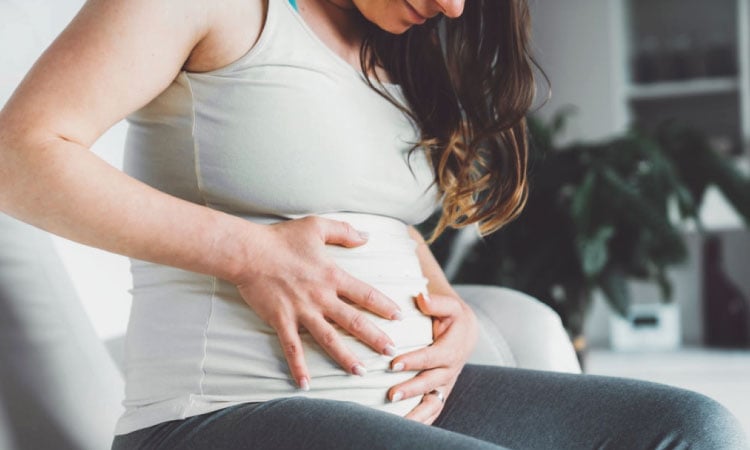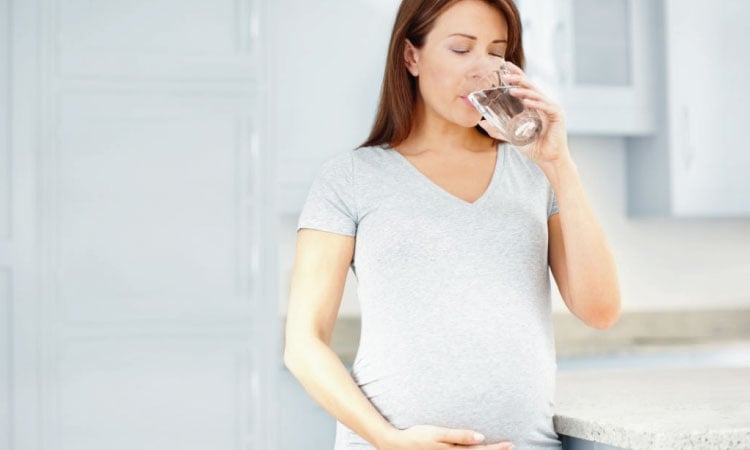Pregnancy is a beautiful phase of a woman’s life and all three trimesters are equally important. The first trimester refers to the initial three months of pregnancy, which starts on the day of conception and ends at the 12th week which is quite challenging and crucial.
This is the time when mothers will put on weight, feel tired and sluggish, experience morning sickness along with other symptoms.
This is also the time when the fetus develops the body parts, nervous system, digestive tract, spine, etc. This is the stage when changes happen physically as well as psychologically, so it is very important to take a few precautions for this phase to pass through smoothly and for the healthy growth and development of the mother and the baby.

Food Precautions During The First Trimester Of Pregnancy
Our panel gynaecologist Dr Ankita Patel Tayal emphasises that it is important to follow a healthy diet and lifestyle during pregnancy to ensure the healthy development of the fetus. Wrong food during the first trimester can have irreversible consequences. Following are the food precautions you need to take to ensure the health of you and your baby during the first trimester of pregnancy:
Related Reading: 21 Pregnancy Superfoods To Include In Your Pregnancy Diet
1. Avoid high mercury fish
Since mercury is a highly toxic element, if taken in excess it can be dangerous for the immune system, kidneys, and nervous system. It can even lead to severe growth and development issues in children. Large marine fishes are found in polluted seas which have higher amounts of mercury.
The main way in which people are exposed to mercury is by eating fish and shellfish that contain the organic version of mercury- methyl mercury1. So high–mercury fishes are not advisable during the first trimester of pregnancy.
Mercury is not found in all types of fish, but some do. High-mercury fish that should be avoided during the first trimester of pregnancy are:
Calculate Due Date With LMP
- Swordfish
- Shark
- King Mackerel
- Tuna
- Marlin
2. Never eat undercooked or raw fish
Raw fishes, especially shellfish can result in many different infections which could be bacterial, viral, or parasitic. Infections can result in weakness, dehydration, etc. This can even get passed on to the fetus with serious after-effects.
Pregnant women are even susceptible to listeria which is 24 times riskier than normal people. Listeria infection can result in miscarriage, premature delivery, stillbirth, and other major issues, etc2.
3. Stay away from undercooked, raw, and processed meat
Undercooked or raw and processed meat can even increase infection from parasites and bacteria like E.Coli, listeria, salmonella, and toxoplasma. Bacteria can be dangerous for the baby’s health resulting in neurological defects, blindness, intellectual disability, and epilepsy.
It is best to avoid having burgers, meat patties, poultry, pork, hot dogs, etc. It is best to not consume processed meat products unless properly cooked or reheated. Consuming chicken during pregnancy has its own benefits & risks.
4. Never eat raw eggs
It is best to avoid raw eggs during pregnancy as they can be contaminated with salmonella bacteria3. The symptoms of salmonella infections are vomiting, nausea, diarrhea, fever, and cramps. In very rare cases, the infection can even result in cramping in the uterus resulting in stillbirth or premature delivery.
Foods that commonly contain raw eggs include poached eggs, lightly scrambled eggs, homemade cake icing, homemade salad dressings, homemade ice cream. It is always advisable to cook the eggs properly or use pasteurized eggs.
5. Caffeine
It is advised by health experts to limit the caffeine intake to less than 200 mg per day. Dr Ankita Patel Tayal, MD obgyn explains why. This is because caffeine gets absorbed quickly and can reach the placenta easily. Excess caffeine intake can restrict fetal growth and even increase the risk of low birth weight at delivery. Therefore, caffeine and a few other drinks should be avoided during pregnancy. Low birth weight is defined as anything less than 5 lbs. or 2.5 kg4.
6. Alcohol
As alcohol increases the risk of miscarriage and stillbirth, it should not be consumed during pregnancy. The consumption of it can even lead to heart defects, intellectual disabilities, and facial deformities in the unborn child. Researchers have found that maternal alcohol exposure during the first trimester adversely affects fetal brain development.
This also increases the risk of stillbirth and intrauterine growth restriction5. Even drinking red wine during pregnancy is not recommended as it might cause many health complications to you and your baby.
Preventing Common Pregnancy Problems During The First Trimester

Following are common pregnancy issues during the first trimester of pregnancy and ways to prevent it:
1. Nausea
According to a study, 50–90% of pregnant women experience nausea and vomiting. It sounds like a very unpleasant one, but it is not something to be scared of. You can prevent pregnancy nausea easily at home or minimize its effect by increasing the frequency of meals and staying well hydrated.
2. Leg cramps
Cramps refer to a sudden, sharp pain that happens in the feet or the calf muscles. It even indicates that muscles are contracting tightly. The cramps trigger at night and can be very uncomfortable. Out of the many reasons, cramps during the first trimester can be attributed to metabolism changes, vitamin deficiency, being sluggish, and not being too active. You can follow our home remedies for legs cramps during pregnancy as they are experienced by all pregnant women. Pregnancy cramps usually begin in the first trimester, but they become more frequent as pregnancy progresses, and they are particularly uncomfortable at night6.
Here are some exercises you can do to prevent leg cramps during the first trimester of pregnancy:
- Smooth and gentle exercises, like swimming, walking and some specific ones like calf raises or on spot walking help to increase the blood flow in the legs and prevent cramping
- Doing moderate exercises throughout pregnancy has many benefits as the body starts adapting to the physical changes that take place in the body
- Stretching calf muscles before sleeping also helps
- Pregnant women can even try leg muscle exercises and foot exercises
- Stretching and bending the foot up and down also helps with cramping
- Rotating the foot 8 times on both sides helps
Dr Ankita Patel Tayal often prescribes her pregnant patients a magnesium and calcium supplement to relieve muscle cramps during pregnancy. She further adds that though it is not important to worry if one experiences cramps, yet medical assistance is required if they are too painful to disturb the sleep.
3. Stomach pains
Getting stomach pains during the first trimester of pregnancy is not a positive sign for the pregnant woman as this is the most sensitive part of pregnancy. It is also a time when morning sickness and hormonal changes take place, and the body starts to accept the hormonal imbalance as well7.
Having any kind of stomach pain during the first trimester of pregnancy is a sign that an instant abortion is about to take place and a rare condition called ectopic pregnancy which is also serious. Under this condition, the fetus starts developing outside of the uterus and does not mature in a normal fashion. Emergency surgery is also done in such a situation which can be harmful to the health of the mother
Related Reading: 7 Home Remedies For Abdominal Pain During Pregnancy
Given below is a table that helps to segregate when the doctor’s intervention is required.
Normal pains Concerning pains See your doctor Nausea/Morning Sickness Severe Abdominal Cramping Abdominal Cramping + Bleeding Lower Back Pain Stabbing Abdominal Pain Abdominal Cramping + Nausea or Vomiting Headaches Severe or Persistent Headaches Bleeding with Fever, Pain, or Chills Breast and nipple tenderness Leg Pain Frequent and painful urination. Achy Joints Pain During Urination Whenever you’re worried, to get relief from anxiety!
11 Precautions To Take During The First Trimester Of Pregnancy

Since the first trimester of pregnancy is very crucial for both the mother and the baby. Following the precautions in the early stages can avoid many complications in pregnancy.
1. Stay hydrated
Fluids are more important in the first trimester of pregnancy since the blood volume increases which is important for fulfilling the nutrient requirements of the growing baby. The changes that take place in the body tend to increase the need for fluid intake, so it is important for a pregnant woman to have plenty of fluids like fresh juice, a good amount of water, and smoothies to keep oneself well hydrated during pregnancy.
2. Make sure you take prenatal vitamins
It is always advisable to take the prenatal vitamins that are suggested by the doctor in the first trimester of pregnancy. It is crucial to have proper folate or folic acid supplements for preventing any birth defects and supplements of iron for preventing anemia8.
3. Quit smoking
Smoking is not advisable throughout pregnancy since it increases some complications like low birth, premature labor, low immunity, miscarriage, and ectopic pregnancy. Sudden infant death syndrome can even be a risk. So, tobacco and passive smoking are not ideal for a healthy pregnancy9.
4. Quit alcohol and cut down on caffeine
Just like tobacco, the intake of caffeine and alcohol can even increase the risk for the mother and the fetus. Alcohol can increase learning disability and even disrupt the cognitive functions of the fetus. It can even result in premature labor so limit the intake of sodas, colas, green and black tea, and chocolates.
5. Watch your food
One should not make unhealthy food choices and even manage weight in an effective manner. Avoid processed foods as they have sodium nitrate traces that can affect the development of the fetus. It is also advisable to avoid preservatives and never have unwashed produce.
Related Reading: Being Overweight During Pregnancy- 10 Potential Complications
6. Never miss prenatal OB/GYN visits
It is important to schedule prenatal appointments and always follow the prescribed medications. It is important to be regular in visits and talk to the doctors in case of any discomfort or pain.
7. Avoid heavy and strenuous exercise
It is not advisable to do heavy exercises like stretches, backbends, and abdominal moves. It is also not advisable to do exercises while lying on the back or put any pressure on the abdomen or do exercises that end up in dehydration.
8. Herbs and medications
Many medications are not advisable during the first trimester of pregnancy and one should also not continue any old medicines as they can be dangerous and end up in miscarriage, painful contractions, and premature labor, etc10.
9. Avoid hot tubs and sauna baths
It is best to take precautions and not stay in high temperatures for long hours as this can lead to neural tube defects in the fetus11.
10. Avoid strong smells
Few women experience an increased sense of smell during pregnancy, also known as hyperosmia and that too in the early months or the first trimester as they can trigger morning sickness and even nausea.
11. Avoid exposure to pets
In the case of having pets at home, it is best to have minimal contact with pets as they carry many parasites like Toxoplasma that are harmful to the growth and development of the baby. It can be dangerous for the brain and can even cause eye defects.
Conclusion

Thus, following the above precautions in the first trimester of pregnancy helps in sailing through the pregnancy smoothly. The first three months are very crucial and if proper care is taken at this time, the rest of the trimesters are easy to pass. Stress is not good for the mother and the baby and neither are negative thoughts. So, it is recommended to stay happy and take proper care for protecting the mother and the baby.
FAQ’s
Yes, it is safe to have an air trip in the first trimester, but one needs to be also aware that the risk of miscarriage is maximum in the initial three months.
And flying for more than four hours can increase the risk of blood clotting. Proper hydration and wearing comfortable clothes with adequate exercise can help in a safe journey.
If the pregnant woman is aware of the physical and emotional changes that can happen during the first trimester, it gives more confidence to the mother in sailing through these months.
A missed period is generally the first sign but other changes like swollen and tender breasts occur as well.
